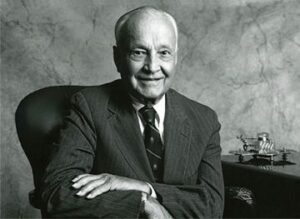Renowned Value Investors: John Templeton
Search Many Markets

John Templeton’s background
John Templeton was an accomplished student at Yale and then at Oxford as a Rhodes Scholar. He was also an accomplished value investor, who pioneered investing at an international level. He did this through a fund, the Templeton Growth Fund.
Templeton was more of a holistic thinker than a specialist. Compared to Walter Schloss, for example, who said he could never look at as many different markets as Templeton did.
Towards the end of his life, John Templeton managed a charitable organization and his international investments from a villa in the Bahamas.
John Templeton’s strategies for value investing
John Templeton ‘invented’ and specialized in what is now known as relative valuation, benchmarking, or comparison with industry peers.
In other words, he found an interesting company, or a promising industry, and then he started comparing all the competitors (in different countries) to each other to see which one was the cheapest or gave the most value in terms of its share price.
More tips from John Templeton:
- Search many markets
- The more people looking in the same market, the harder it is to find good buys
- Avoid companies in bad countries
- Examples of what constitutes bad countries to invest in: high taxes, high inflation, socialism and communism, strong labor unions
- The best buys come when you are first in a market, as Templeton was in investing in Japan; he bought stock companies that were equal to many US competitors, for a fraction of the price. Many of these companies could be bought for a P/E between 2 and 3, even though they were large, stable and profitable.
- Templeton did not believe in technical analysis, but used mainly fundamental analysis
- Real estate is always interesting as an investment class, as it resists inflation well
- So are quality brands
- Avoid industries with high political risk; in Templeton’s time it was mainly banks and mining companies
- Portfolio management: Avoid the psychological tendency to spend most time on your 3 newest (small) holdings, instead of spending that time on your 3 largest holdings.
A quote from John Templeton:
“A flexible point of view is the professional investor’s greatest asset and will become increasingly important in the future.”
Read more: About the strategies of other famous value investors.







